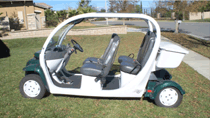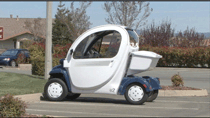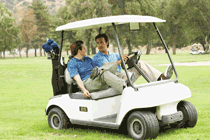You always need:
- An Application for Title or Registration (REG 343) form.
- The out-of-state title or manufacturer’s certificate/statement of origin.
- A Verification of Vehicle (REG 31) form.
- Registration fees.
You may also need:
Neighborhood Electric Vehicle (NEV)/Low-Speed Vehicle (LSV) Definition (CVC §§ 385.5, 21250)
An NEV/LSV is a motor vehicle that:
- Has four wheels.
- Within one mile can reach a speed of more than 20 miles per hour (mph) but not more than 25 mph on a paved level surface.
- Has a 17-digit conforming vehicle identification number (VIN)
- Has a gross vehicle weight rating (GVWR) of less than 3,000 pounds.
- Must be certified to meet Federal Motor Vehicle Safety Standards (FMVSS) to be registered and operated on public streets, roads, or highways.
- May look like a golf-cart to the casual observer, but is actually a motor vehicle requiring a valid California driver license, registration, and insurance.


Operation of NEVs/LSVs
Local authorities, by ordinance or resolution, may restrict or prohibit the use of NEVs/LSVs. An NEV/LSV may:
- Not be operated on any roadway with a speed limit above 35 mph.
- Cross state highways only at controlled intersections. Crossing at uncontrolled intersections is permitted with approval of the local authority governing that intersection.
- Cross at intersections that have a speed limit above 35 mph, if the crossing begins and ends on a road of 35 mph or less.
- Be operated as a golf cart within a distance of one mile or less from a golf course or on roads designated for such operation by ordinance or resolution by a local authority.
Modified/Altered NEVs/LSVs (CVC §21254)
If you modify or alter your NEV/LSV to go faster than 25 miles per hour, the vehicle no longer qualifies for the relaxed FMVSS established for NEV/LSVs. Your vehicle will be required to meet the same FMVSS established for passenger vehicles. Failure to comply with all necessary regulations may result in a citation.

Golf Cart (CVC §345) Definitions
A golf cart is a motor vehicle designed to:
- Carry no more than two persons, including the driver.
- Carry golf equipment.
- Have no less than three wheels in contact with the ground.
- Operate at a maximum speed of 15 mph.
- Weigh no more than 1,300 pounds unladen (empty).
Operation of Golf Carts (CVC §§ 345,21115, 21115.1 and 21716)
Registration is not required if you operate your golf cart on a highway designated for such use by ordinance or resolution within one mile of a golf course.
You may not operate on a road with a speed limit above 25 mph except by ordinance or resolution by a local authority.
Modified Golf Carts
A golf cart cannot be converted for registration as an NEV/LSV. If you modify your golf cart to go faster than 15 mph or seat more than two persons, the vehicle is considered a regular motor vehicle and must comply with FMVSS for passenger vehicles.
FMVSS include additional vehicle equipment, appropriate FMVSS labels, applicable emission standards, and a 17-digit conforming VIN. Failure to comply with all necessary regulations may result in a citation.
Golf Cart Equipment Requirements (CVC §24001.5)
Golf carts must comply with certain equipment standards established by the California Highway Patrol (CHP) to be registered for on-road use. Equipment requirements are outlined in the Motorcycle, Motor Driven Cycle, and Motorized Bicycle Requirements (CHP 888) form available at chp.ca.gov.
You must complete a Statement of Facts (REG 256) form, which states the vehicle meets the definition of a golf cart (CVC §345) and has not been modified. If the golf cart is gasoline-powered, it must bear a label certifying the vehicle complies with California emissions requirements.
If you drive your golf cart on the road it must be equipped with:
- At least one headlamp, tail lamp, and stop lamp.
- A rear reflector.
- Front/rear turn signals.
- Front/side reflectors.
- A mirror (located in a position to allow the driver a rear view of at least 200 feet).
- A horn.
- Fenders.
- A safety-glazed windshield.
- Windshield wipers.
Sales By a Dealer
Dealers must provide buyers of an NEV/LSV with a disclosure statement regarding the operation of the vehicle (CVC §21252).
If you purchase a vehicle from a California dealer, they will submit your paperwork to DMV.

